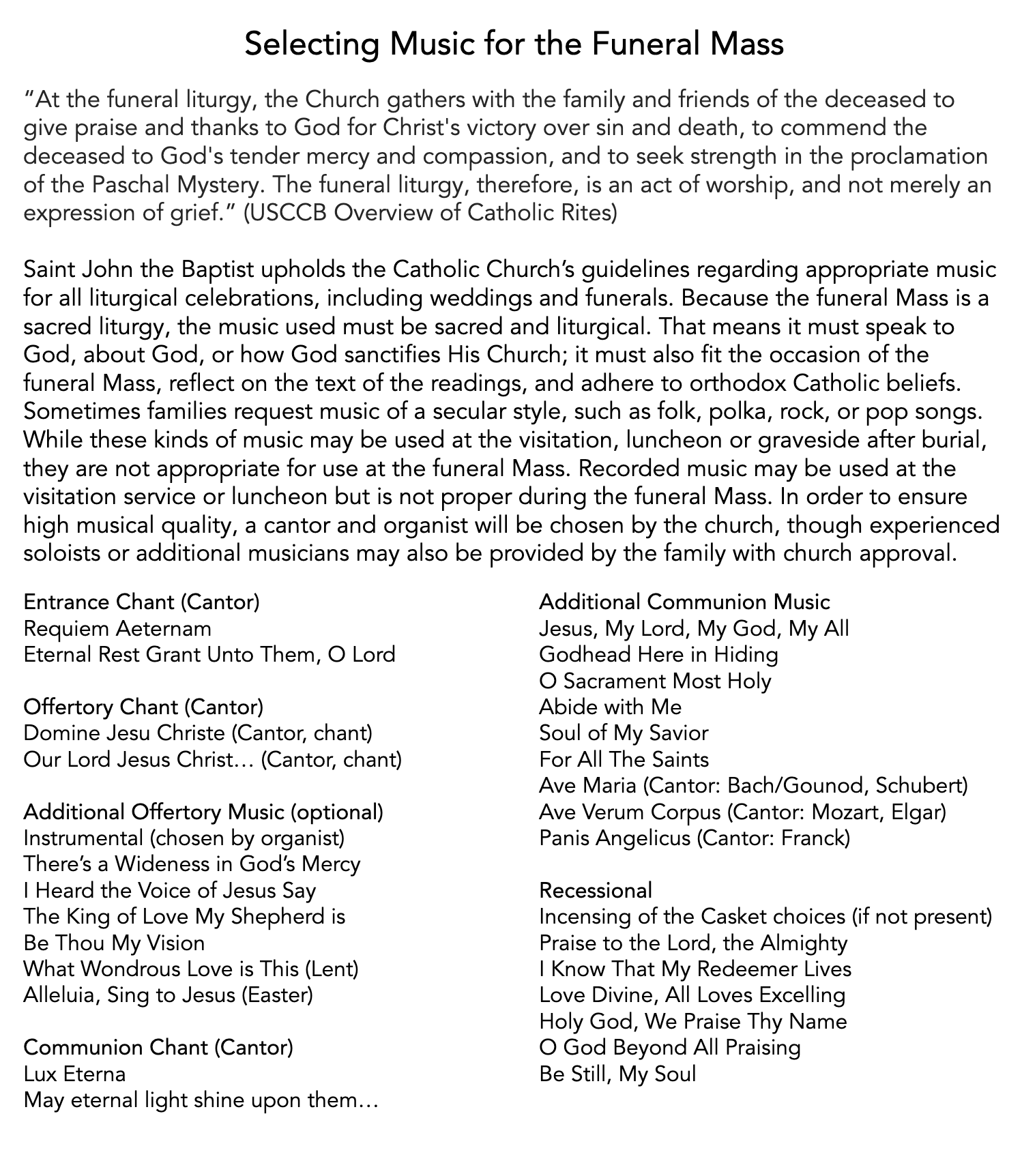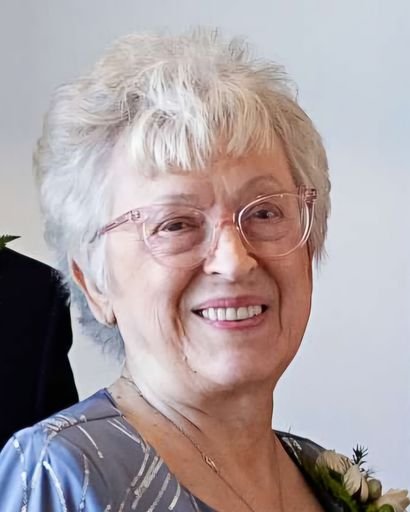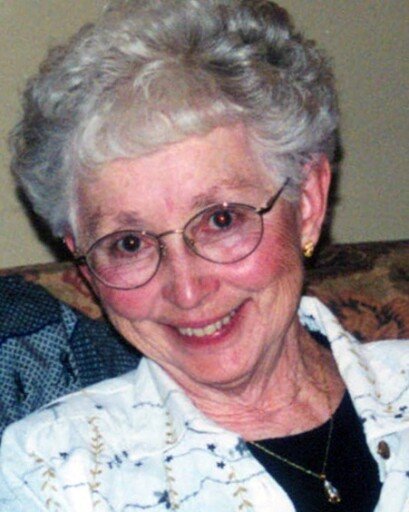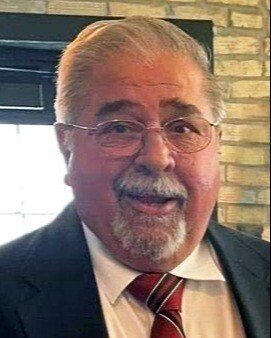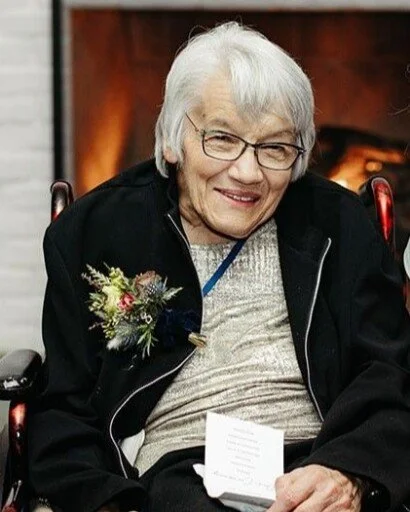FUNERALS
CATECHISM OF THE CATHOLIC CHURCH
1681 The Christian meaning of death is revealed in the light of the Paschal mystery of the death and resurrection of Christ in whom resides our only hope. The Christian who dies in Christ Jesus is “away from the body and at home with the Lord.”
1683 The Church who, as Mother, has borne the Christian sacramentally in her womb during his earthly pilgrimage, accompanies him at his journey’s end, in order to surrender him “into the Father’s hands.” She offers to the Father, in Christ, the child of his grace, and she commits to the earth, in hope, the seed of the body that will rise in glory. This offering is fully celebrated in the Eucharistic sacrifice; the blessings before and after Mass are sacramentals.
APOLOGETICS & CATHOLIC DOCTRINE - Archbishop Michael Sheehan
“The purpose of a funeral is (1) to pray for the soul of the deceased; (2) to bring God's consolation to those who mourn ; and (3) to dispose of the body ritually and reverently in expectation of the resurrection. For a deceased Catholic, a Requiem Mass is most suitable, for in the Eucharist, "the Church expresses her efficacious communion with the departed: offering to the Father in the Holy Spirit the sacrifice of the death and resurrection of Christ, she beseeches that His child be purified of his sins and their consequences, and be admitted to the Paschal fulness of the table of the Kingdom ."Eulogies and attempted 'canonization' (declaration that the deceased "is in heaven") are out of place at a Catholic funeral, and offer false consolation to family and mourners. What the dead need are prayers , not praise.It is no consolation to a soul in Purgatory to be lauded on earth when a congregation should be praying for its eternal repose.”
WHAT TO DO
Step 1 - Please call the parish office to setup a time to meet with a staff member to plan the funeral.
Step 2 - Staff will work with you to help pick readings, music, and take care of any other arrangements to make the funeral mass a healing experience.
POLICIES & GUIDELINES
In order to make this a healing and stress-free experience for families and friends, some policies are needed to help avoid those things which can cause difficulty when planning and carrying out a funeral at Saint John’s. These policies are not here to make things burdensome, but to best accomplish a beautiful and meaningful funeral liturgy.
FUNERAL DIRECTOR
A Funeral Director is necessary in order to have a Funeral Mass at Saint John’s as they help accomplish many “behind the scenes” tasks which cause unnecessary burden upon the grieving.
FUNERAL SCHEDULING
Due to the need for staff to be onsite to setup and enact a successful funeral liturgy, there are only certain days of the week available. Funeral’s may (generally) be scheduled Tuesday through Friday.
FUNERAL LUNCHEON
From the Funeral Lunch Committee, updated June 13, 2021:
”From this point forward, funeral lunches are going to resume. There are new regulations regarding the funeral lunches. The new menu is as follows; ham & turkey sandwiches, potato chips, pickles, sheet cake, coffee, milk, and water. No outside food or beverages will be allowed. Food donations can no longer be accepted, they will be sent home with the family.”
LITURGY
Holy Mother Church provides a rich funeral liturgy for the deceased and their family. The purpose of the funeral Mass - which is offered to God, for God, by God - is to pray for the deceased, seek comfort from God in your time of loss, and to commend the soul of the deceased to God.
READINGS
The Liturgy has some room for adaptation and flexibility when it comes to which readings are to be used. The Catholic Church provides a selection from which can be chosen an Old Testament, Responsorial Psalm, New Testament, and Gospel reading. Saint John’s Catholic Church extends the opportunity for personalization to the family, to select which reading from the approved list they’d like to have. The following is a list of approved readings from which a family may choose:
The official translation of all readings can be found in the Catholic Lectionary. Other translations are not allowed in the funeral liturgy. The exact translation and chapter/verse numbers from the approved readings list above are what must be used, and they will be provided for the lector on the day of the funeral.
Lectors for the Funeral Mass MUST be actively practicing Catholics.
WORDS OF REMEMBRANCE
Words of remembrance, if they are insisted upon by the family or friends of the deceased, are ordinarily to be delivered at the wake/visitation, the burial of the deceased, or at another gathering of family and friends outside of the Funeral Liturgy itself.
With the pastors permission, such words might also be delivered immediately prior to the start of the Funeral Mass, that is, immediately prior to the sprinkling of the casket.
If Words of Remembrance are to be delivered immediately prior to the start of the funeral Mass, then:
They must be submitted to the Pastor no later than 24 hours prior to the funeral, in writing by emailing them to: frneil@sjbjordan.org
The must be no longer than one page, single spaced, 12 point font.
The delivery must not exceed 5 minutes in length.
They are to begin directly after the prelude played by the organist.
The reader walks up to ambo, introduces himself/herself, proceeds, and then the family joins the priest in the gathering space to begin the Mass.
MUSIC
Music selections for the liturgy will be made by the professionals at Saint John’s Church. Requests for hymns will be considered but cannot be guaranteed to be used in the funeral liturgy.
Not all music is appropriate for Church, and even less appropriately reflects the dignity and reality of what is happening in the Holy Mass. In September of 2020 the Committee on Doctrine at the USCCB - United States Conference of Catholic Bishops - produced a guide for helping to judge whether music is doctrinally suitable for liturgical use.
BURIAL
It is important that the body of the deceased be treated with the utmost respect and dignity.
“GREEN”/”NATURAL”/”WATER” CREMATION (ALKALINE HYDROLYSIS)
This is not a morally licit choice for cremation and must be avoided. The United States Conference of Catholic Bishops (USCCB) issued a document in March of 2023 stating that “This procedure does not show adequate respect for the human body, nor express hope in the resurrection. “ Read the full document here.
If you are considering alkaline hydrolysis as a cremation option, it is imperative that you alert the pastor of Saint John’s of this decision, as this is a morally objectionable option and may impact your ability to have a Funeral Mass.
IMMEDIATE BURIAL
Please click here to read an important document from the Vatican regarding the burial of the deceased and the conservation of the ashes in the case of cremation.
“…the ashes of the faithful must be laid to rest in a sacred place, that is, in a cemetery…”
“…the conservation of the ashes of the departed in a domestic residence is not permitted…the ashes may not be divided among various family members and due respect must be maintained regarding the circumstances of such a conservation.”
“…it is not permitted to scatter the ashes of the faithful departed in the air, on land, at sea or in some other way, nor may they be preserved in mementos, pieces of jewelry or other objects.”
CEMETERIES
Click here for information on our cemeteries.
DAILY MASS CANCELED WHEN THERE IS A FUNERAL
Per Canon 905 §1. “A priest is not permitted to celebrate the Eucharist more than once a day except in cases where the law permits him to celebrate or concelebrate more than once on the same day.” While priests in the Archdiocese of Saint Paul and Minneapolis have been given permission to celebrate more than one Mass on a weekday, it is the Pastor’s opinion that the spirit of Canon 905 be upheld and that the sanctity of the once-per-day Mass be retained as much as possible. Therefore, Saint John the Baptist has implemented a policy to cancel the Daily Mass when there is a funeral scheduled. The Mass Intention for that day is then moved to another day, and the requestor is notified. Parishioners and Daily-Mass-goers are encouraged to attend the funeral of the day and to pray for the deceased.


